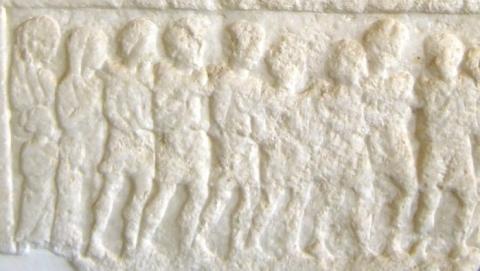Medicine, Science and Enslavement in the Classical World: Encompassing Intersections
Panel for the 15th Celtic Classics Conference, Cardiff, 9-12 July 2024.
Co-organisers: Rebecca Flemming (Exeter) and Laurence Totelin (Cardiff)
When the notable Roman physician Soranus of Ephesus discussed, ‘whether women have conditions peculiarly their own’ (Gynaecology 3.1), he felt he needed to explain all the terms involved. To illustrate what ‘their own’ (idia) means and does not mean in this context he reached for some obvious examples: a personal piece of clothing on the one hand and jointly owned land or slaves on the other. The point is also an obvious one: mass enslavement was central to all aspects of Greco-Roman society and culture. The intersections between medicine, science and slavery reach far beyond the prominence of enslaved (and freed) practitioners, particularly doctors, in early imperial Rome or the theories of Aristotle, into the formation of key concepts, the production of knowledge, and the labour of writing. The hospital (valetudinarium) may be a creation of large-scale enslavement, for instance, a site of resistance as well as exploitation, the buying and selling of enslaved people attracted both medical and astrological expertise, and ‘slavishness’ was an accusation deployed to police modes of thought and intellectual relationships.
This panel attempts to explore all these themes and more, trying to be as encompassing and diverse as possible in our coverage. We invite abstracts from scholars at any stage in their academic career, including PhD students, for papers that address any aspect of the topic.
Confirmed speakers include: Claire Bubb (NYU); Serafina Cuomo (Durham); Rebecca Flemming (Exeter); Anna Bonnell Freidin (Michigan); Maria Gerolemou (Johns Hopkins); Arthur Harris (Cambridge); Georgia Petridou (Liverpool); Laurence Totelin (Cardiff).
Please submit abstracts, maximum 300 words, for either a 40- or 20-minute paper (please say which in your submission) to Prof. Rebecca Flemming, University of Exeter (r.flemming@exeter.ac.uk), by February 16th 2024. Please provide a short biographical note, including any institutional affiliation and relevant research interests, with your abstract. Some funding will be available to PhD students giving papers, thanks to the University of Exeter. This is essentially an in-person conference though we may be able to support virtual presentation.
General information about the event as a whole can be found on the Conference Website. Any questions please contact Rebecca Flemming (r.flemming@exeter.ac.uk).

